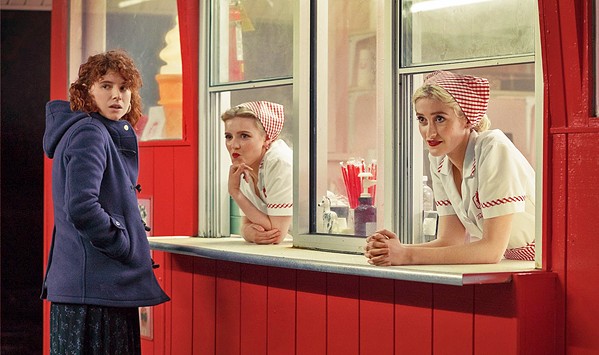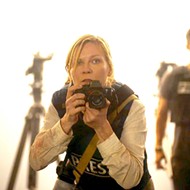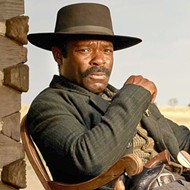I'm Thinking of Ending Things finds Charlie Kaufman again exploring the male psyche
By Glen and Anna Starkey[{
"name": "Ad - Medium Rectangle CC01 - 300x250",
"id": "AdMediumRectangleCC01300x250",
"class": "inlineCenter",
"insertPoint": "8",
"component": "2963441",
"requiredCountToDisplay": "12"
},{
"name": "Ad - Medium Rectangle LC01 - 300x250",
"id": "AdMediumRectangleCC01300x250",
"class": "inlineCenter",
"insertPoint": "18",
"component": "2963441",
"requiredCountToDisplay": "22"
},{
"name": "Ad - Medium Rectangle LC09 - 300x250",
"id": "AdMediumRectangleLC09300x250",
"class": "inlineCenter",
"insertPoint": "28",
"component": "3252660",
"requiredCountToDisplay": "32"
}]
Writer-director Charlie Kaufman (Being John Malkovich, Eternal Sunshine of the Spotless Mind, Anomolisa) helms this surreal tale that on the surface is about a young woman (Jessie Buckley) going to meet her boyfriend's (Jesse Plemons) parents (Toni Collette and David Thewlis) for the first time, but is really about memory, longing, and regret. Based on Iain Reid's 2016 novel, the film offers a confusing but fascinating look at the male psyche. (134 min.)
Editor's note: While Staff Writer Karen Garcia reviewed this film in our Sept. 17 issue, this film is so compelling that Glen and Anna decided to dive in for themselves.
Glen After this film ends, you might, like me, go looking for answers. I recommend IndieWire's "Charlie Kaufman's Guide to I'm Thinking of Ending Things: The Director Explains Its Mysteries," but before you read that, watch this film, succumb to it, let it wash over you, and just go with it! Like other Kaufman films, it gets really weird, but it's so compelling. You know you're watching something profound, but it feels just out of reach of your understanding. Ostensibly about a young woman reluctantly going to meet her boyfriend's parents—a boyfriend, I should add, who she's thinking of breaking up with—it's really about the boyfriend, Jake, and his own memories and regrets. Jake's a fascinating character brought to life by Plemons. He seems like a good guy, a smart guy, but a complicated guy. His relationship with his parents is strained, and as the evening wears on, we start to question if he's really a good guy after all. Meanwhile, the young woman (who's called by various names through the film) is clearly struggling with her relationship with Jake. The film's voiceover is her thoughts, and so it can at times seem like the story's about her, but it's really about Jake. Kaufman is well known as a voracious reader, art lover, and film buff, so there are references galore throughout, but whether you get them all or not, the film remains both entertaining and confounding. For instance, you'll wonder until the third act why the film keeps cutting to scenes of an aged janitor cleaning a high school during a production of the musical Oklahoma! Don't worry. It becomes clearer!
Anna I sort of had an idea of where this was going, though even then there was a bunch to parse. Buckley plays the enigmatic lead, unwilling to fall into happiness just because of the ease of it all. She tries to talk herself into liking Jake but can't quite convince herself; she knows once again the end is near. But what's one dinner with the parents with a promise of a drive home? To say the night takes some odd turns is an understatement. Jake may be smart, but he is insecure—embarrassed by his parents, especially his seemingly doltish mother who appears to be losing her grip on reality minute by minute. Time plays tricks on you in this film and soon you'll be asking yourself if you just saw what you think you saw, or perhaps just a trick of the light? Soon enough it all becomes a mind game where who and what to believe becomes increasingly muddled. It's incredibly fascinating, as Kaufman's films always are. The meat is in the small moments, the confusing but quiet clues we are given, and inevitably the conclusion that leaves a dazed look on your face. I didn't know what to expect from this, and I'll say I got the unexpected. It's a film you'll most likely think about for a long time after the credits roll.
Glen My favorite moment is when, during the drive, Jake and the young woman begin to talk about John Cassavetes' 1974 film A Woman Under the Influence, for which he was nominated for a Best Director Academy Award. Suddenly the young woman begins a searing dissertation on the film, which is actually a verbatim recitation of New York film critic Pauline Kael's scathing review of Cassavetes' film. I love reading Kael, whose reviews were brilliant, biting, and highly opinionated, so I recognized her words coming out of the young woman's mouth. Earlier in the film when the young woman was in Jake's childhood bedroom, we saw a book of Kael's film criticism, as well as other items—books, videos, artwork—referenced in the film. Like I said, you don't need to "get" all this to enjoy the film, but it makes the film much for fun when you do. The film's end is very open, and I wouldn't be surprised if some viewers think, "That's it? Huh?" But there is a sense of resolution, and if you read IndieWire's explanation, I think you'll enjoy the film even more and want to return to it to revel in all of Kaufman's references. I'd love to read what Kael thinks of the film, but alas, she died in 2001.
Anna At some point we start to piece together that we may be looking at some sort of other world, and the young woman's desperation to return to the city keeps falling on deaf ears. Jake is such an odd and complex character; he prides himself on his intelligence yet still feels woefully inadequate. When the two are finally back on the road, they stop for a late night ice cream, and the stand is manned by three young women, two of them cliquey, popular, and pretty, and one very sweet but markedly less striking. Jake can't even bring himself to look at them, reverting to the mannerisms of an embarrassed child, and I couldn't help but wonder what in the world is going on with this guy? Kaufman's films can take a while to figure out, and this one is no different. It may be introspective and quiet, but it is also fascinating. As you mentioned, the ending comes a bit unexpectedly and without concrete resolve, but that's a neat trick to keep the audience thinking about your film for a long time, and it worked again here. This is definitely worth a watch when you have the headspace for it. Δ
Senior Staff Writer Glen Starkey and freelancer Anna Starkey write Split Screen. Glen compiles streaming listings. Comment at [email protected].










